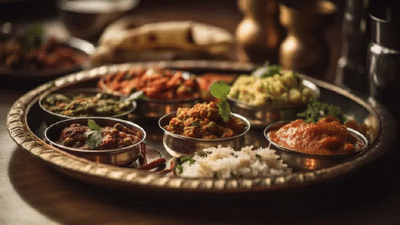
In Sanatan Dharma, the customs and rituals that take place after death hold special importance. One of these is Mrityubhoj, which is mostly organized on the 13th day of a person's death. This tradition has been going on for a long time, but many questions arise in the society regarding this. Like is it right to eat Mrityubhoj? Does Mrityubhoj lead to sin? Let us know what the scriptures say about Mrityubhoj?
Mrityubhoj, also known as Brahmabhoj or Terhvin Bhoj. It is organized on the thirteenth day of death for the peace of the soul of the deceased. It is a mass feast. In Hinduism, funeral (last rites) is considered the last of the 16 rites. After the funeral, the concerned family remains in mourning for 13 days. In this, rituals like Dashagatra, Ekadashi and Dwadashi are performed. At the same time, on the thirteenth day of death, food is served to Brahmins, relatives and people of the society. In this meal, the favorite things of the deceased are made and it is organized in the memory of the deceased. Let us know what the scriptures say about this?
What does Garuda Purana say?There is no direct mention of mrityu bhoj in Garuda Purana, but the law of Brahmabhoj and donation is mentioned on the thirteenth day. Garuda Purana states that after death, the soul wanders between its family and home for 13 days. Brahmabhoj and donation on the thirteenth day gives the soul virtue, which helps it in the afterlife. However, this feast should be only for poor and learned Brahmins and should not be done for social display. According to Garuda Purana, if wealthy people take mrityu bhoj, then it is a sin like snatching the right of the poor.
Lord Krishna said it was inappropriateIn the Mahabharata's Anushasana Parva, Shri Krishna has said that 'Sampriti Bhojyani Aapada Bhojyani Va Punaih'. This means that food should be taken only when the mind of both the one who is feeding and the one who is eating is happy. It is not appropriate to eat food in a state of sorrow and pain. According to this, it is morally wrong to eat food when the family is immersed in grief. Shri Krishna refused to eat food before the war on the request of Duryodhana, because his mind was not happy at that time.
What does Manusmriti say?Manusmriti mentions the rules of Shraddha and food. Manu Maharaj says that in Shraddha, an odd number of learned Brahmins should be fed and this food should be eaten with a pure heart. Manusmriti also says that shedding tears in grief is prohibited, because it hurts the soul in the afterlife. Organizing a funeral feast for social show is prohibited in the scriptures and doing it by taking a loan is even more wrong.
What is the social significance of funeral feast?The purpose of starting mrityu bhoj was social and psychological. In olden times, when medical facilities were limited and there was a risk of spreading germs after death, rituals like Dashagatra and sprinkling Gangajal were performed to purify the house. Organizing a meal on the thirteenth day was to provide social support to the family of the deceased and reduce their grief. Relatives would help the family by bringing grains, vegetables and other materials. It was a symbol of solidarity.
However, over time this tradition has been distorted. In today's times, it has become common to invite thousands of people to the funeral feast, spend heavily and take loans due to social pressure. This is against the scriptures and becomes an economic burden for poor families. Many scholars consider this a bad practice, which is not appropriate from the social and religious point of view.
Disclaimer: The information given here is based on the beliefs of religious scriptures and is being given for information only. News Crab does not confirm it.
PC:News24